A solar refrigerator allows you to enjoy fresh food without using electricity.
A solar refrigerator allows you to enjoy fresh food without using electricity.
Blog Article
The Significance of Solar Fridge in Modern Renewable Resource Practices
The integration of solar refrigerators within modern sustainable power techniques stands for a significant advancement in sustainable technology. By utilizing solar energy for cooling, these systems not just lower reliance on typical power resources however likewise address important concerns such as food conservation and access to vital medicines in remote regions.
Benefits of Solar Refrigerators
Solar refrigerators consistently supply many advantages that make them an enticing option for both domestic and commercial usage. Among the key benefits is their capability to harness sustainable energy, significantly minimizing reliance on typical electrical energy sources. This not only decreases energy costs however additionally adds to ecological sustainability by reducing greenhouse gas emissions.
One more key benefit is their effectiveness in remote locations where standard power supply may be undependable or nonexistent. Solar refrigerators make it possible for individuals and organizations to maintain food safety and security and preserve disposable goods, therefore improving food safety and security in underserved locations.
Additionally, solar fridges typically need reduced maintenance contrasted to standard versions, as they have fewer moving components. solar refrigerator. This results in enhanced durability and durability, giving an affordable option with time. They also operate calmly, adding to a much more enjoyable living or functioning setting
Furthermore, the adoption of solar refrigeration innovation straightens with international efforts to promote tidy power services and combat climate modification. By spending in solar fridges, customers not just profit directly but additionally contribute to wider sustainability campaigns, making them a forward-thinking option for the modern age.
How Solar Refrigerators Work

Solar refrigerators typically consist of a battery storage system to ensure performance during periods of reduced sunlight or nighttime. When sunshine is abundant, the PV panels create electrical power to run the compressor and charge the batteries. The kept energy can after that be utilized when solar power is insufficient, preserving a consistent temperature level inside the fridge.
Numerous solar fridges also integrate energy-efficient parts, such as LED lighting and high-performance insulation, to lessen energy usage. The performance of these units is additionally enhanced by passive cooling methods, which can consist of reflective surfaces and thermal mass materials that assist keep amazing temperature levels.
Applications in Off-Grid Areas

In remote areas, where traditional refrigeration options are frequently impractical or inaccessible, solar fridges provide a sustainable remedy. They make it possible for regional farmers to store subject to spoiling produce, thus lowering waste and improving great site food safety and security. Additionally, in medical care settings, solar refrigerators make certain that injections and important medicines stay viable, adding to much better health end results for populations that could otherwise face considerable barriers to medical care access.
In addition, the implementation of solar fridges in off-grid areas can boost regional economic situations by assisting in the establishment of tiny organizations, such as food processing and circulation. As these communities gain accessibility to dependable refrigeration, they can take part in value-added activities, eventually bring about enhanced resources. The adoption of solar refrigeration innovation represents not only a sensible response to power obstacles but likewise a critical investment in the durability and sustainability of off-grid areas.
Environmental Impact and Sustainability
The combination of solar fridges into power systems considerably improves ecological sustainability by reducing reliance on nonrenewable fuel sources and lessening greenhouse gas exhausts. By utilizing solar power, these fridges run without the demand for conventional electricity, which is usually created from fossil gas resources. This transition not only curtails carbon footprint however additionally advertises cleaner air quality, as less pollutants are released into the environment.
In addition, solar fridges are created to be energy-efficient, commonly utilizing advanced insulation technologies and power monitoring systems. These features more reduction energy consumption, causing an extra sustainable cycle of use. In country and off-grid locations, solar fridges give crucial air conditioning without the ecological prices linked with diesel generators or various other fossil fuel-based systems.
In addition, the fostering of solar refrigeration adds to the decrease of food wasting, consequently reducing food waste and its connected environmental impacts. As food manufacturing and waste are substantial contributors to greenhouse gas emissions, boosting food conservation with sustainable cooling approaches plays a crucial function in overall ecological stewardship. Consequently, solar refrigerators not only stand for a technological development yet also align with more comprehensive objectives of sustainability and ecological duty.

Future of Solar Refrigeration
Imagining a future where solar refrigeration becomes the norm exposes its possible to transform the method we come close to cooling down and food Home Page preservation. As improvements in photovoltaic or pv technology remain to progress, solar refrigerators are anticipated to come to be more efficient, budget-friendly, and obtainable. This shift will not only decrease dependence on nonrenewable fuel sources yet also considerably reduce greenhouse gas discharges connected with typical refrigeration methods.
Innovative designs, such as solar-powered absorption and thermoelectric refrigerators, are likely to acquire traction, particularly in off-grid and backwoods. The combination of wise innovations, including IoT abilities, will enhance go to these guys user experience and optimize energy usage. The consolidation of power storage space remedies will certainly allow solar refrigerators to provide consistent air conditioning also during periods of reduced sunshine. solar refrigerator.
The agricultural sector stands to profit greatly, as solar refrigeration can expand the life span of perishable items, lowering food waste and enhancing food safety and security. As governments apply encouraging policies and incentives, paired with enhanced consumer recognition, solar refrigeration might become a standard technique across numerous sectors. Inevitably, the future of solar refrigeration guarantees a sustainable and reliable method to air conditioning, essentially transforming food conservation and energy usage worldwide.
Conclusion
In recap, solar refrigerators stand for a critical innovation in renewable resource methods, offering many benefits consisting of reduced reliance on fossil gas and improved food conservation in off-grid areas. Their procedure harnesses solar power efficiently, consequently advertising sustainability and reducing ecological impact. As modern technology proceeds to advance, the potential for solar refrigeration to add to local economies and wider sustainability objectives will likely expand, strengthening its relevance in the transition towards a cleaner, extra sustainable energy future.
Report this page